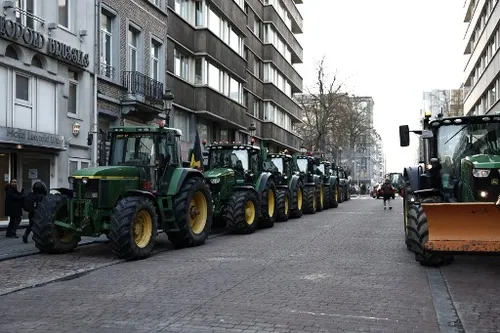
The capital of Belgium received hundreds of tractors from European farmers this Thursday morning (1) in protest against several national and regional measures considered harmful by workers in the sector. One of them is the Free Trade Agreement between the European Union and Mercosur, which is in the final stages of negotiation and should be the topic of this week’s European Council meeting.
Protesters blocked several roads in Brussels and were repressed by local politics. In addition to the acts in the city, during this week farmers sought to interrupt activity in large ports and other economic centers in Belgium, France, Italy, Spain, Germany and Portugal.
The mobilization in Luxembourg Square was called by European rural entities and also by the regional coordination of Via Campesina, which classifies Europe’s neoliberal policies as mainly responsible for the suffering of farmers. “Immediately stop the treaty between Mercosur and the EU and suspend the FTAs [tratados de livre comércio] of agriculture”, demanded the organization in a statement.
Via Campesina also points to free trade agreements, market deregulation, subsidies from the European support plan for farmers “which are distributed in a completely unfair way”, carbon markets and “the lack of global vision for a transition to more sustainable agricultural models”.
In another statement, published jointly by Via Campesina coordination in Europe and Latin America on Tuesday (30), the movement classifies the treaty between Mercosur and the EU as “anti-democratic and violating peasants’ rights and climate commitments” , and highlights that the treaty is based on an “obsolete paradigm in which agricultural products are treated like any other commodity, without taking into account human rights, the climate and biodiversity crises, food sovereignty and the rights of food producers to fair income.”
The entity states that the commodification of land, water and seeds leads to the impoverishment of the rural population and warns of the role of corporations that progressively control food systems and “can only be competitive because they are heavily subsidized by public money and because they are not obliged to pay the health, environmental and social costs of their industrial production model”.
Macron tries to prevent agreement
Upon his arrival in Brussels this Thursday, Irish Prime Minister Leo Varadkar said that the agreement between Mercosur and the European Union “cannot be ratified in its current form” in a nod to the position expressed by French President Emmanuel Macron, whose government has been moving for the European bloc to renounce the agreement.
According to a report by journalist Jamil Chade published by UOL, the French president reportedly sent a message to the head of the European Commission, Ursula van der Leyen last weekend, saying that he will not accept the agreement on the grounds that the alleged invasion of food exported by South America would put farmers at risk French. Macron’s most incisive position came at a time when the European Union executive accepted the conditions placed by Brazil in relation to the agreement, which had previously been denied.
Among the main proposals of the government of Luiz Inácio Lula da Silva presented by Itamaraty are the exclusion of the SUS from any opening of markets for the participation of Europeans and in public tenders and the creation of a margin of preferences for Brazilian companies in public tenders, taking into account the objectives of the government’s new industrial policy.
What are the problems with the agreement?
Paulo Nogueira Batista Jr, former vice-president of the Novo Banco de Desenvolvimento, from Brics, published in Brazil in fact an article about the Mercosur-EU agreement. In it, he says that the problems are so many that it would take 50 pages to describe them. However, he cites five examples of how the text is erratic:
:: Mercosur-EU Agreement: time to abandon a dangerous negotiation ::
1) According to Batista Jr, Europeans would gain free access to our industrial markets with the agreement, but make few concessions in areas in which Mercosur countries are competitive. The agreement reduces import taxes on more than 90% of trade in goods to zero. It turns out that, in Brazil, the tax for importing industrialized goods is 15.2%; in the European Union, 1.8%. “In other words, the reduction to zero on our side is an important advantage for the Europeans, but on their side the decrease is residual, insufficient for Brazil to be able to export industrial goods.”
2) The agreement prohibits the collection of export taxes, which is permitted under the rules of the World Trade Organization (WTO). According to Batista Jr, if well calibrated, this tax can contribute to investments in adding value to agricultural and mineral commodities. “This is what China and Indonesia, among other countries, do,” he said.
3) Batista Jr. highlights that the agreement prohibits state companies from acting in public policies on product prices and purchases of local products. This, for example, would affect development policies and supplier training programs used by Petrobras. Argentina, he recalls, excluded several strategic state-owned companies from the scope of the agreement. Brazil did not exclude any.
4) The agreement weakens Brazilian family farming, as it almost completely liberalizes trade in what is produced by it, wrote Batista Jr. “Our family farmers would be threatened by imports from Europeans produced with high subsidies.”
5) Agribusiness gains little or nothing from the agreement, since the agricultural sector would continue to be managed by quotas. He informs that the quotas are either insufficient (lower than current Mercosur exports to the EU), or “fictitious” (for products in which the competitiveness of the European product hardly makes room for South American exports) or “harmless” (for products who no longer face barriers in the EU).
Editing: Lucas Estanislau
Source: www.brasildefato.com.br

